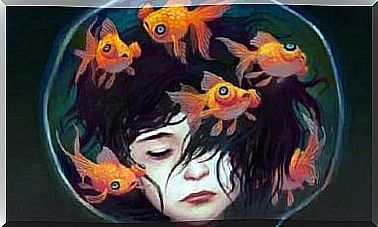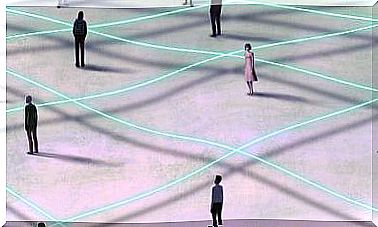Alzheimer’s And Self-awareness, Progressive Loss Of Identity

Can you imagine that little by little the aspects that you consider most important in your life will be blurred? That is to say, that you stop remembering the essential, including who you are and who you have been. This is a not too distant reality for people with neurodegenerative diseases. Today we will delve into the relationship between Alzheimer’s and self-awareness.
We will begin the journey by defining both Alzheimer’s disease and self-awareness. Later we will show your link and focus on the loss of identity. In addition, we will show recent data from scientific research.
Alzheimer’s disease and self-awareness, what are they?
Alzheimer’s is a neurodegenerative disease that has no cure and affects memory, orientation, language, motor skills, behavior, personality and other psychological processes. Therefore, it affects the activities that the person previously carried out normally and causes them to become more and more dependent. This makes it difficult to handle, both for those who live it, and for those around that person.
According to the Royal Academy of the Spanish language, self-awareness is ‘self-awareness’. Psychology and philosophy have studied this concept throughout the history of humanity and it is difficult to reach an agreement, since the self manifests itself in different ways and is related to multiple processes.
Currently, theoretical models tend to see this multiplicity and its relationship with cognitive processes such as memory. In fact, self-awareness is studied in the normal and pathological aging process, as it is in the case of Alzheimer’s disease.
Alzheimer’s and self-awareness, what is their relationship?
Alzheimer’s disease and self-awareness are closely related. It turns out that, as the disease progresses, there is a sharp decline in memory. When the person is not capable of evoking memories, they are not capable of knowing about themselves; therefore, your identity is affected.
Various investigations assert this. Specific approaches suggest that in relation to self-consciousness this may be due to the decline of autobiographical memory, that which is related to our experiences. This type of memory is divided into two:
- Semantic memory. Covers general knowledge and repetitive aspects.
- Episodic memory. Related to experiences associated with a specific place and time.
In people with Alzheimer’s disease (AD) these memories are impoverished, although their decline is different. Experimental studies have shown that episodic memory can be strengthened in patients who are in the severe and moderate phase. This would imply that the person is able to self-recognize and evoke past images and experiences, although not fully.
For example, Gandolphe, El Haj and Antonie (2018) in their published scientific article, showed that through olfactory reminiscence they could improve this type of memory in patients with AD.
Alzheimer’s disease and identity
Autobiographical memory helps us define our lives, as well as build a story about them. For this reason, in Alzheimer’s disease, its decline is linked to a progressive loss of self-knowledge and, consequently, of the sense of identity.
Let us remember that for there to be self-consciousness, the self must be formed. When the individual stops remembering what they did and making sense of their lived experiences, they lose their sense of identity. This is a huge and difficult situation for caregivers of people with Alzheimer’s disease to face, but a reality that they must face.
People with this disease forget, in the first moments, the most recent events. So they can still retain their sense of identity. However, little by little this weakens and begins to affect their long-term memory, causing them to lose perspective on their own biography.
In fact, Klein and colleagues (2004) suggest that self-awareness involves an introspection ability about our own experiences and thinking. Without it, we will be unable to distinguish our mental states from our mental representations. We would even lose the ability to recognize ourselves in the mirror, an issue that can happen to people with Alzheimer’s disease in advanced stages.
In short, multiple processes are affected in Alzheimer’s disease ; within the cognitive ones, memory is one of them. Its decline is closely related to the poor ability to recognize life experiences, therefore, it implies a progressive loss of self-awareness linked to a decline in the sense of identity of the person who has the disease.









